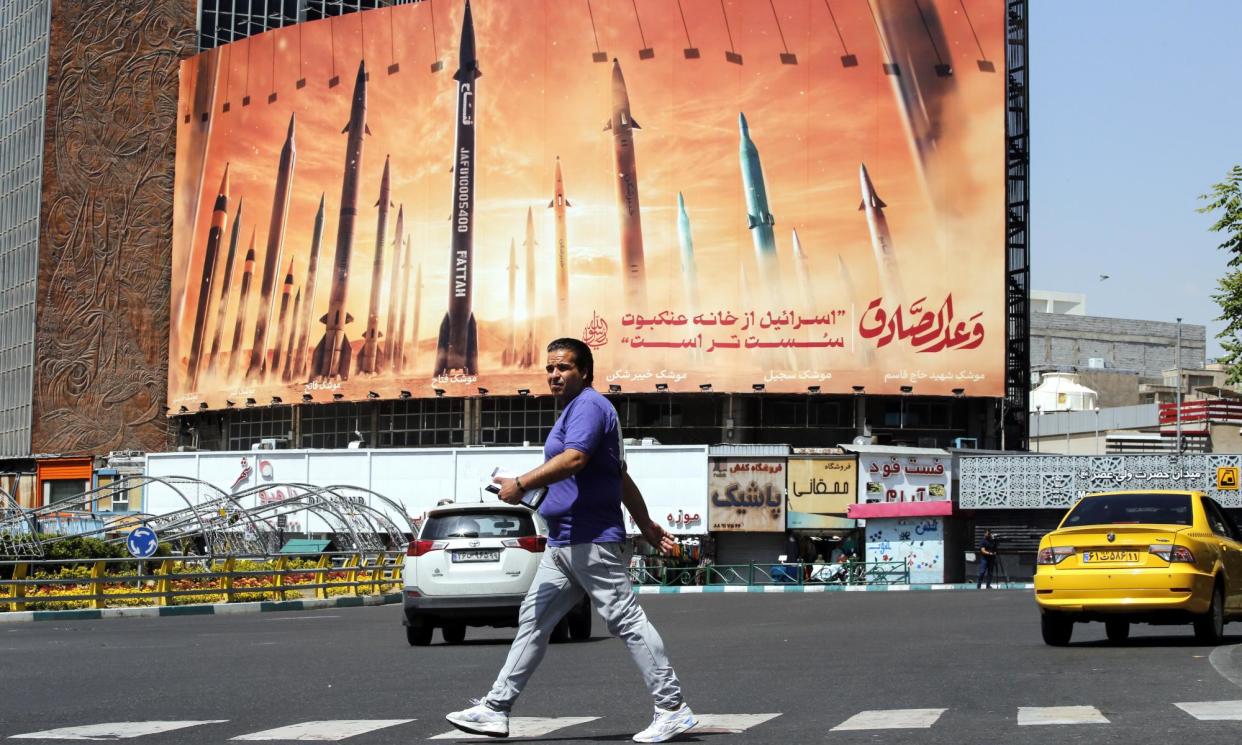Iran plays down impact of Israeli airstrikes but remains on high alert

Tehran has played down the impact of Israeli airstrikes carried out against Iran, raising hopes that a cycle of escalatory state-on-state attacks can be averted – and that previous Iranian threats to retaliate harshly will be shelved.
But Iran remains on alert in case the attacks, during which explosions were reported in the sky over the cities of Isfahan and Tabriz, do not mark the end Israel’s response to the massive missile and drone attack launched by Tehran last Saturday night.
Speaking in New York, the Iranian foreign minister, Hossein Amir-Abdollahian, said the drones caused no damage or casualties. “The Zionist regime’s media supporters, in a desperate effort, tried to make victory out of their defeat, while the downed mini-drones have not caused any damage or casualties,” he said.
The military commander of Isfahan province in central Iran said the explosion heard early on Friday morning was due to air defence firing at suspicious objects and that the action did not lead to any accident or damage on the ground. Other reports suggested that the windows in several office buildings were broken.
The Iranian army chief, Maj Gen Abdolrahim Mousavi, gave a muted response: “There were several flying objects that were shot at. Any madman can do foolish things.” He claimed that five small targets had been shot down close to the Isfahan eighth fighter base that houses SU-24 bombers.
The drones were reportedly shot down close to Qahjavarestan, near Isfahan airport and the 8th Shekari army airbase.
Isfahan lies about 62 miles (100km) south of the Natanz nuclear site, the underground centrepiece of Iran’s uranium enrichment programme. State television described all nuclear sites in the area as “fully safe”.
The veracity of official Iranian reports on the damage inflicted on its defences is often disputed, but the fact that Tehran is portraying the incursion as relatively minor will be taken as a sign that it is not planning further reprisals. If both sides can claim a victory from the latest round of incidents, neither needs to take further action.
Iran’s media claimed that the western press was full of “fantasies” about attacks on several cities, while Tamsin News, which is linked to the Iranian Revolutionary Guard Corps, focussed on the response of Itamar Ben Gvir, the far-right Israeli security minister, who described the strikes as “weak”.
The Iranian president, Ebrahim Raisi, made no mention of the overnight strikes when he gave a speech in Semnan province east of Tehran, focusing instead on Iran’s attack on Israel. “All political groups and currents believe that this response was a necessary, unifying and great honour for the country,” he said.
Mohammad Javad Zarif, a former Iranian foreign minister, said: “Genocide continues apace in Gaza. Nothing will divert international public opinion from Israel’s atrocities.
“Israel’s recurring acts of aggression against Iran, especially its provocative attack on Iran’s diplomatic premises in Syria, went unpunished by the UN security council, compelling Iran to take a measured response in self-defense targeting only military facilities and – unlike Israel – intentionally avoiding civilians. Now, in light of today’s reckless fireworks in Isfahan, all countries and leaders should focus on ending Israeli transgressions, particularly its war on Gaza.”
Sergei Lavrov, Russia’s foreign minister, also sent an indirect message to Tehran by saying the west was trying to stoke a conflict in order to divert attention from the crisis in Gaza. A figure of influence in Tehran, Lavrov’s implicit advice was that Iran should not fall into the trap by prolonging the conflict.
Iranian defence analysts are assessing the degree to which the weekend events showed Israel can defend itself by itself, and in response to “the big blow” inflicted by Iran, had felt forced to de-escalate.
Meanwhile, inside Iran, anger continues unabated that – a this moment of national tension – the regime has decided to launch another crackdown on women for not wearing the hijab.


